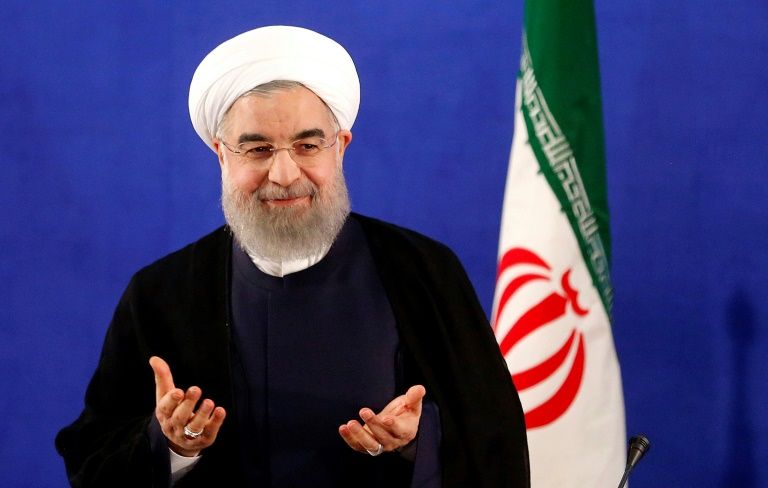Rouhani Starts Second Term With Trump’s Shadow Hanging Over Tehran

EghtesadOnline: Hassan Rouhani this week officially starts his second term at the helm of Iran’s government, with the optimism of his landslide victory in May now eclipsed by a deepening standoff with the U.S.
The moderate cleric, 68, won another four years as president with his promise to build on the 2015 nuclear deal with world powers and boost the economy. He was confirmed in his position by Supreme Leader Ayatollah Ali Khamenei on Thursday, ahead of an inauguration ceremony in parliament attended by dozens of foreign dignitaries two days later, Bloomberg reported.
Alongside top politicians and defense officials at the confirmation ceremony, Rouhani said he would make poverty eradication and job creation the focus of his presidency, underlining the need for “large scale investment” and access to advanced technologies. The nuclear deal showed Iran’s “goodwill” in engaging internationally, he said in comments aired live on state television. “We will not accept isolation, we will not surrender to ill-wishers.”
The global and domestic backdrop is far from auspicious. The U.S. under Donald Trump has swung behind Iran’s chief Mideast rival, Saudi Arabia, in the process condemning Iranian missile tests and foreign policy as major threats to regional security and adding sanctions. Trump’s next target could be the nuclear pact itself. At home, Rouhani faces hardliners who reject engagement with the West and who have been energized by the shift in Washington, as well as citizens disappointed by the slow pace of economic and social change.
“The political environment is very tough,” said Aniseh Bassiri Tabrizi, a research fellow at the Royal United Services Institute in London. Rouhani will likely continue to lead “Iran toward remaining compliant to its commitments and doing everything in his power to avoid provocations and an escalation of tensions with the U.S,” she said.
EU Presence
Monitors have asserted Iran is meeting its commitments to scale back its nuclear program in return for sanctions relief. Tehran says missile development -- which wasn’t covered by the seven-party agreement -- is part of its sovereign defense strategy, and it accuses the U.S. of infringing the nuclear deal by obstructing the normalization of trade with Iran.
European signatories to the 2015 accord remain broadly supportive of Rouhani, and European Union foreign policy chief Federica Mogherini will attend the ceremony in Tehran on Saturday. What’s unclear, though, is how far EU nations are willing to go in defense of the pact, said Ali Vaez, a senior Iran analyst at International Crisis Group.
France and Germany now “have significant business ties with Iran,” he said, but decisions will have to made by consensus “if Europe is to move beyond discouraging Washington and toward deterring it from undermining the agreement.”
Rightward Shift
The president “doesn’t practice what he preaches on women,” said Amene Shirafkan, a journalist who stood as a reformist candidate in Tehran’s city council elections. “He uses the women’s case to gain support in elections and draw votes but it’s not his priority.”
Trump’s decision to expand non-nuclear sanctions on Iran has been a setback for Rouhani, who made their removal a feature of stump speeches. The curbs have spooked major banks and hindered Iran’s oil-led economic recovery, delaying the president’s efforts to spread the benefits of his diplomacy to poorer Iranians, who have registered their impatience.
Speaking after delivering his endorsement of the president, Khamenei, Iran’s highest power, advised officials to “remain on the lookout.” He added: “International interaction should not make us forget that there are enemies hell-bent on destroying us, and they will use any excuses.”
An uncompromising assault on the nuclear deal would have even more far-reaching consequences, said Vaez at Crisis Group. The accord’s collapse “would shift the mainstream of Iranian politics to the right,” forcing Rouhani and his chief ally -- Foreign Minister Mohammad Javad Zarif -- to adopt a more confrontational approach, he said.
The success of the next four years will to a large extent depend “on how much the U.S. will push against Iran, and how much other partners and allies will push back against the U.S,” said Bassiri Tabrizi.
Rouhani and his team “are aware that they have only one card to play,” she said. “They knew in 2013 it was the nuclear deal or nothing. Now they know it’s fixing the economy or nothing.”


